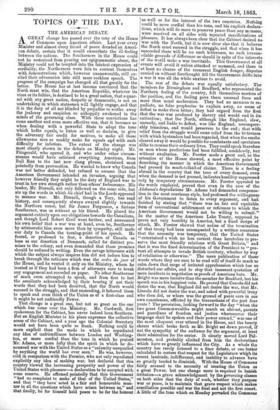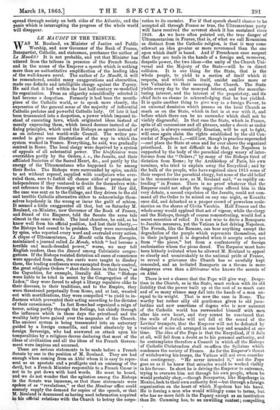TOPICS OF THE DAY THE AMERICAN DEBATE.
A. GREAT change has passed over the tone of the House of Commons upon American affairs. Last year every Minister and almost every friend of peace dreaded an Ameri- can debate, certain that it would exacerbate the ill-feeling between the nations. The Southerners in the House could not be restrained from pouring out epigrammatic abuse, the Ministry could not be tempted into the faintest expression of cordiality, the Northerners were fain to content themselves with demonstrations which, however unanswerable, still ex- cited their adversaries into still more reckless speech. The progress of the campaign has changed all that greatly for the better. The House has at last become convinced that the North must win, that the American Republic, whatever its vices or its foibles, is destined to be a great nation, that a quar- rel with any great nation, despotic or democratic, is not an undertaking in which statesmen will lightly engage, and that it is the duty of all not blinded by prejudice to soothe away the jealousy and suspicion so unhappily awakened in the minds of the governing class. With these convictions has come another and even more effective one, that it becomes us when dealing with a powerful State to adopt the tone which befits equals, to listen as well as declaim, to give the adversary fair credit for motives, to make all those allowances men so readily make for equals ad with such difficulty for inferiors. The extent of the change was most clearly shown in the debate on Monday night. Mr. Fitzgerald, who opened it, and who under other circum- stances would have satirized everything American, from Bull Run to the last new slang phrase, abstained most pointedly from provocation. He wanted to know why Canada was not better defended, but refused to assume that the American Government intended an invasion, arguing that however friendly they might be the duty of England was to trust in her own strength rather than others' forbearance. His leader, Mr. Disraeli, not only followed on the same side, but ate up the words in which his chief had in the Lords appeared to menace war. Mr. Disraeli, though a Tory, has read history, and consequently always swayed slightly towards the Northern cause, but Sir James Fergusson, a furious Southerner, was as reticent as his friend. He placed the argument entirely upon our obligations towards the Canadians, and though Lord Robert Cecil went farther, and announced his own belief that a war was at hand, even he, Southerner by aristocratic bias even more than by sympathy, still made our duty to Canada the turning-poiet of his speech. He feared, or professed to fear, a desertion of Canada as base as our desertion of Denmark, called for distinct pro- mises to the colony, and even demanded that those promises should be reduced to writing. Even the savage bitterness with which the subject always inspires him did not induce him to break through the reticence which was the ordre du jour of the House, and he vented it only on the Ministry, whom he treated as if they had been a firm of attorneys sure to break any engagement not recorded on paper. No other Southerner of mark even attempted to speak, and from first to last the assailants acknowledged by their bearing if not their words that they had been deceived, that the North would succeed in the struggle, and that succeeding, it behoved them to speak and even think of the Union as of a first-class and it might be not unfriendly Power. That change is a great one, but not so great as the one which has come over the Ministry. Mr. Cardwell, first spokesman for the Cabinet, has never indeed been Southern. But an English Minister in his place expresses the collective sense of the Cabinet, and a year ago the Colonial Secretary would not have been quite so frank. Nothing could be more explicit than the mode in which he repudiated any idea of unfriendliness between London and Washing- ton, or more cordial than the tone in which he praised Mr. Adams, or more lofty than the spirit in which he de- nounced war with the United States as a "calamity unequalled by anything the world has ever seen." He was, however, cold in comparison with the Premier, who not only repudiated explicitly any idea of making war, but declared that this country viewed the increasing prosperity and power of the United States with pleasure—a declaration to be accepted with some reserve. He affirmed pointedly that this Government "had no complaint to make of that of the United States," and that "they have' acted in a fair and honourable man- ner in all the questions which have arisen between us," and that finally, he for himself held peace to be for the honour as well as for the interest of the two countries. Nothing could be more cordial than his tone, and his explicit declara- tions, which will do more to preserve peace than any menaces,. were received on all sides with repeated manifestations oE pleasure. It has always been clear that the Cabinet desired no war with the North, but it is now clear also that it believes. the North must succeed in the struggle, and that when it has succeeded there will be no such bitterness, no such irrecon- cilable grounds of difference as should in spite of the interests of the world make a war inevitable. This Government at all events will avoid it unless attacked or menaced, and there ig at least no chance of the recurrent English danger, disputes. carried on without forethought till the Government drifts into, a war it was all the while anxious to avoid.
The rest of the debate was equally satisfactory. The members for Birmingham and Bradford, who represented the- Northern feeling of the country, felt themselves masters of the position, and the feeling gave them unusual force and more than usual moderation. They had no menaces to re- pudiate, no false prophecies to explain away, no sense of defeat to make them bitter; they had argued from the first that the war was produced by slavery and would end in its. extinction ; that the North, although like England, slow, unready, and liable to defeat, was like England, unconquer- ably tenacious, and would persevere to the end ; that with, relief from the struggle would come relief from the bitterness with which bystanders had been regarded, that when the smoke cleared away it would be possible for combatants and spectators. alike to resume their ordinary lives. They could speak therefore as men whose predictions had been fulfilled, confidently, but without exultation. Mr. Forster made a great and, as the attention of the House showed, a most effective point by describing the manner in which the American Government had pressed its much-talked-of claims. There is a feeling- abroad in the country that the tone of every demand, even when the demand is not pressed, indicates hostility suppressed only by temporary circumstances. Mr. Forster appealed to the words employed, proved that even in the case of the. Alabama's depredations Mr. Adams had demanded compensa- tion in the most courteous style, had professed the willingness of his Government to listen to every argument, and had finished by stating that "there was no fair and equitable form of conventional arbitrament or reference to which the American Government would not be willing to submit." In the matter of the American Lake Treaty, supposed .to prove not only hostility in America, but a fixed design of attack, Mr. Forster showed that notice of the termination of that treaty had been accompanied by a written assurance that the necessity was temporary, that tho -United States "entertained a wish no less earnest than heretofore to pre- serve the most friendly relations with Great Britain," and that it was the fixed determination of the President to "pre- vent all attempts to invade British territory, whether by way of retaliation or otherwise." The mere publication of those words where they are sure to be read will of itself do much to calm down that surge of irritated apprehension which has so disturbed our affairs, and to stop that incessant quotation of mere incidents in negotiation as proofs of American hate. Mr. Bright was more incisive than the member for Bradford, but his speech was in his happiest vein. Ile proved that Canada did not desire the war, that England did not desire the war, that Mr. Lincoln did not desire the war, and asked with powerful irony who then did, or where was the ground of panic save in our own consciences, afflicted by the transactions of the past four. years ? The peroration, looking forward to the day "when the two great Commonwealths might march on abreast, parents and guardians of freedom and justice wheresoever their language shall be spoken and their power extend," was one of the most eloquent ever uttered in the House, and the hearty cheers which broke forth as Mr. Bright sat down proved, if not the sympathy of the audience for the argument, at least their admiration for the orator. It clearly moved Lord Pal- merston, and probably elicited from him the declarations which have so greatly influenced the City. As a whole the country has rarely listened to a finer debate, or one better calculated to restore that respect for the Legislature which its recent lassitude, indifference, and inability to advance have so greatly tended to diminish. With the House of Commons fairly aroused to the necessity of treating the Union as a great Power, but one change more is required to banish irritation—a grave acknowledgment by the governing classes on both sides that the duty of each, whether they purpose war or peace, is to maintain that grave respect which makes conciliation possible and war the final and not the first resort. A little of the tone which on Monday pervaded the Commons
spread through society on both sides of the Atlantic, and the panic which is interrupting the progress of the whole world will disappear.































 Previous page
Previous page